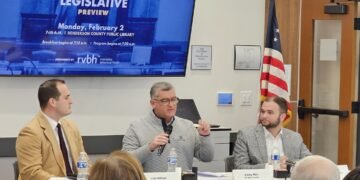Courtesy of Kentucky Lantern
LOUISVILLE — Public education advocates are asking Kentucky’s General Assembly to invest $718 million more in the state’s schools.
The request comes from Protect Our Schools, a coalition of educators, administrators, students and parents who want more money in K-12 education in the state’s next two-year budget, which is up for debate in January. However, Republican lawmakers are skeptical of the proposal.
Protect Our Schools pointed out that the $718 million figure is the same as a half-percent income tax cut approved earlier this year by the General Assembly.
During a Louisville press conference, Rockcastle County Superintendent Carrie Ballinger said the proposed investment would be about 3% of the state’s overall budget and would reflect a spending increase of $1,161 per Kentucky student. As a school administrator, she says she sees gaps between what students deserve and what schools can provide them.
“This is not about spending more, however,” Ballinger said. “This is about investing wisely. Every dollar we invest in education today is a dollar that we are investing in our workforce of tomorrow. This reduces reliance on government assistance, strengthens our families and fuels the Kentucky economy.”
Ballinger added that while Kentucky’s last two-year budget “was the highest that we have seen in terms of raw dollars,” it falls short of 2008 levels of investment because of inflation.
The $718 million investment could raise SEEK funding, or Support Education Excellence in Kentucky, by 14% and aid in fully funding transportation costs as well as support resources like textbooks, professional development and technology in classrooms across the state. The SEEK formula determines the amount of state funding to local school districts.
Earlier this year, Protect Our Schools launched a statewide listening tour to gather information about education in Kentucky ahead of the 2026 legislative session. When lawmakers return to Frankfort in January, they will decide the next two-year state budget.
Asked for comment about Protect Our Schools’ request, Republican House Speaker David Osborne said in a statement that the General Assembly has “provided a record amount of funding and resources to public education and K-12 school funding accounts for the largest general fund category.”
“Despite this, far too many Kentucky children don’t read or understand math at grade level,” he said. “It is past time for the education bureaucracy to stop demanding more money and instead focus on the classroom and helping students reach their potential.”
In Kentucky, education funding is a testy topic between public school advocates and Republican lawmakers. While some groups like the Kentucky Education Association have argued paying teachers more would incentivize more people to go into the profession, Republicans have argued the General Assembly, controlled by the GOP, has provided a historic level of K-12 education funding.
The Kentucky Center for Economic Policy, a left-leaning think tank based in Berea, says K-12 funding has not kept pace with inflation. Real total budgeted state SEEK funding is 24% below 2008 levels for this fiscal year, the policy center said in a report released last month.
After the defeat of Amendment 2 last year, Protect Our Schools transitioned to a wider education advocacy role. The group was one of the highest fundraising political action committees against the proposed constitutional amendment, which would have allowed the General Assembly to fund nonpublic schools and was backed by many members of the General Assembly.
Paris Republican Sen. Steve West, the chairman of the Senate Education Committee, told the Kentucky Lantern in an interview Monday afternoon that he did not foresee lawmakers wanting to increase taxes. Also, West noted, the state’s revenue and budget numbers for the last fiscal year did not meet the thresholds the legislature set in 2022 to consider another income tax rate cut next year.
West also added that Republicans have increased K-12 education funding by a billion dollars over the past two budgets.
Also over the summer, the use of existing education funding has been scrutinized. Republican Auditor Allison Ball’s office released an examination of the Kentucky Department of Education that found the department failed to use $250 million in SEEK funding during fiscal years 2021-24, though KDE disputed the finding in the report. In particular, Fayette County Public Schools, the state’s second largest district, has faced turmoil over its budget proposals and spending. West said news reports such as these factor into lawmakers’ decisions about budgets.
As a member of the legislature for more than a decade, West said he would anticipate Republicans to continue to focus on conservative budgets.
“We will continue to pass very conservative budgets that protect the budget reserve trust fund that fund our obligations, as pertains to the pension system and other things, that protect our bonding capacity and our credit rating,” West said.



















